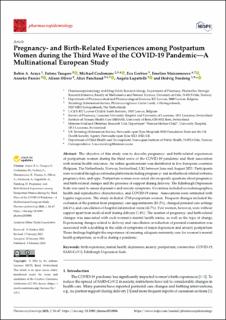| dc.contributor.author | Araya, Robin A. | |
| dc.contributor.author | Tauqeer, Fatima | |
| dc.contributor.author | Ceulemans, Michael | |
| dc.contributor.author | Gerbier, Eva | |
| dc.contributor.author | Maisonneuve, Emeline | |
| dc.contributor.author | Passier, Anneke | |
| dc.contributor.author | Panchaud, Alice | |
| dc.contributor.author | Lupattelli, Angela | |
| dc.contributor.author | Nordeng, Hedvig Marie Egeland | |
| dc.date.accessioned | 2023-05-02T11:32:37Z | |
| dc.date.available | 2023-05-02T11:32:37Z | |
| dc.date.created | 2023-03-15T14:58:35Z | |
| dc.date.issued | 2023 | |
| dc.identifier.citation | Pharmacoepidemiology. 2023, 2 (1), 54-67. | |
| dc.identifier.issn | 2813-0618 | |
| dc.identifier.uri | https://hdl.handle.net/11250/3065741 | |
| dc.description.abstract | The objective of this study was to describe pregnancy- and birth-related experiences of postpartum women during the third wave of the COVID-19 pandemic and their association with mental health outcomes. An online questionnaire was distributed in five European countries (Belgium, The Netherlands, Norway, Switzerland, UK) between June and August 2021. Participants were recruited though socialmedia platforms including pregnancy- and motherhood-related websites, pregnancy fora, and apps. Postpartum women were asked eleven specific questions about pregnancyand birth-related changes and the presence of support during delivery. The Edinburgh Depression Scale was used to assess depressive and anxiety symptoms. Covariates included sociodemographics, health and reproductive characteristics, and COVID-19 status. Associations were estimated with logistic regression. The study included 1730 postpartum women. Frequent changes included the exclusion of the partner from pregnancy care appointments (83.2%), changed prenatal care settings (64.4%), and cancellation of hospital information visits (42.7%). Few women, however, were without support apart from medical staff during delivery (1.4%). The number of pregnancy- and birth-related changes was associated with each woman’s mental health status, as well as the type of change. Experiencing changes related to delivery and cancellation or reduction of prenatal examination was associated with a doubling in the odds of symptoms of major depression and anxiety postpartum. These findings highlight the importance of ensuring adequate maternity care for women’s mental health postpartum, as well as during a pandemic. | |
| dc.description.abstract | Pregnancy- and Birth-Related Experiences among Postpartum Women during the Third Wave of the COVID-19 Pandemic : A Multinational European Study | |
| dc.language.iso | eng | |
| dc.title | Pregnancy- and Birth-Related Experiences among Postpartum Women during the Third Wave of the COVID-19 Pandemic : A Multinational European Study | |
| dc.title.alternative | Pregnancy- and Birth-Related Experiences among Postpartum Women during the Third Wave of the COVID-19 Pandemic : A Multinational European Study | |
| dc.type | Peer reviewed | |
| dc.type | Journal article | |
| dc.description.version | publishedVersion | |
| dc.source.pagenumber | 54-67 | |
| dc.source.volume | 2 | |
| dc.source.journal | Pharmacoepidemiology | |
| dc.source.issue | 1 | |
| dc.identifier.doi | 10.3390/pharma2010006 | |
| dc.identifier.cristin | 2134187 | |
| cristin.ispublished | true | |
| cristin.fulltext | original | |
| cristin.qualitycode | 1 | |
